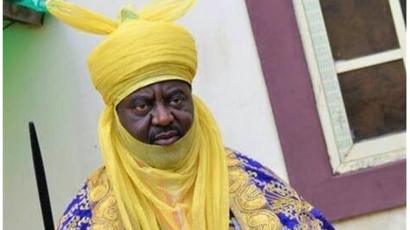Nigeria sovereigns, each and all of whom insist on being obeyed at the price of consequences of infinite elasticity, says Odinkalu
By Chidi Odinkalu
Colonial rule in Nigeria was conducted through Indirect Rule. It was a system of “native administration” patented in Northern Nigeria, which became the model exported by the British across their colonies. For all practical purposes, this system of government gave to most Emirs and other rulers in Chiefly communities, “more power than they had in pre-colonial days.”
The result, was the establishment of “native states” at the top of which sat these local potentates, many of whom enjoyed powers of life and death over their kinsfolk. The end of colonial rule did not much change this as they reached working accommodation with the post-colonial elite for self-preservation. Powered by twin failures of both leadership and nation-building, the result in Nigeria, where it all began, is one country with a multiplicity of sovereigns.
The ongoing dispute between the Emir of Kano, Alhaji Aminu Ado Bayero, and Air Peace, a private airline in Nigeria, dramatises this. The claim on behalf of the Emir is that he flew Air Peace from Banjul, The Gambia to Nigeria, on 24 February, landing in Lagos about 05:45 hours. He was at the head of a ten-person travelling party who had a connecting flight to catch to his home in Kano, north-west Nigeria scheduled for 06:15 hours the same morning, a mere 30 minutes after they landed. Five out of the ten members of the Emir’s travelling party were business class passengers.
READ ALSO
Obi empowers 100 indigent women in Nsukka
Upon landing in Lagos, the Emir’s cousin, Isa Sanusi Bayero, reportedly “personally called the Chairman of Air Peace, Allen Onyema, to inform him of the precarious situation and requested him to assist by delaying their departing flight to Kano as a mark of respect to the revered Emir of Kano.” He conveniently forgot to disclose how long it took them to clear Immigration.
When Mallam Isa got no purchase, it is reported that he “personally took this as an insult and a flagrant show of disrespect to his highness and the Kano people at large”, whereupon he petitioned the Director-General of Nigeria’s Civil Aviation Authority, NCAA, Captain Isa Nuhu, ominously demanding his “kind intervention for restitution and for appropriate measures to be taken to stop this unwholesome development from happening in the future.”
It is relevant that the flight to Kano had closed checking in by the time the Emir’s flight from Banjul landed. The passengers, each of whom had a contract with the airline, were already seated. The Emir’s travelling party had luggage that was going to take some time to retrieve from the cargo hold before they could proceed to the domestic terminal from the international airport.
None of this could be concluded in anything remotely approximating the time they had before the flight was scheduled to depart. The only way to comply with the request was to keep the passengers and aircraft on the tarmac for as long as it took the Emir and his travelling party to clear immigration, extract their luggage from the international airport and then transit to the domestic terminal.
Isa Bayero is better known as “Isa Pilot” because he is a trained pilot of considerable experience who had himself commanded Nigeria’s Presidential Air Fleet (PAF) and, by his own admission, flew five former Nigerian Presidents. Casting all that aside, Mallam Isa assessed that he had no need or heed for the rules of the NCAA. A unique neural short-circuit found only in Nigeria enabled him to fathom that the chairman of the airline could pull a rabbit out the bag in clear defiance of both contract and civil aviation law.
Consider a passenger calling the Chairman of British Airways or Delta Airlines to ask them to hold an aircraft with passengers fully boarded on the tarmac at London Heathrow or Hartsfield-Jackson Atlanta International for an indeterminate duration beyond departure while a royal party takes its time to saunter its merry way to the departure terminal. Isa Bayero, the faux-potentate who divined this request, is incapable of shame. Rather he feels affronted.
Three days after his initial complaint to the NCAA, Isa Bayero issued an ultimatum to Air Peace demanding that they “tender an unreserved apology to the Emir of Kano, Alhaji Aminu Ado Bayero, over alleged ‘flagrant disrespect’ to the revered institution’”, darkly warning the “airline to be ready to face multiple consequences, including loss of market share in Kano, if it fails to show regret for the inconveniences metted (sic) out to the Kano Emir.”
This example of a country whose rules are not good enough for its many sovereigns is not an exception. It is easily the norm. These Nigerian sovereigns, each and all of whom insist on being obeyed at the price of consequences of infinite elasticity, do not all come bedecked in turbans or royal capes. They are all citizens for whom ordinary rules are insufferable sources of inconvenience and, therefore, liable to be dispensed with at at a whim. The response of the government and its institutions has been habitual abdication. The consequences are incalculable. Three of them bear brief attention.
First, these many sovereigns have succeeded in retrenching the institutions that should govern Nigeria’s public commons, with adverse results for living standards across the country. A study published 20 years ago led by Daron Acemoglu of the Massachusetts Institute of Technology, MIT, concluded among other things that “improving Nigeria’s institutions to the level of Chile could, in the long run, lead to as much as a 7-fold increase in Nigeria’s income (in practice Chile is over 11 times as rich as Nigeria).” In 2020, Chile’s score in the Human Development Index (HDI), was 0.851 out of a maximum of 1.0, ranking it 43rd out of 189 countries globally. It was the highest performing country in South America. By contrast, Nigeria scored 0.539, placing it 161 on the same ranking (a whopping 114 places below Chile), a difference largely explained by institutional incapacities inflicted on the country by its many sovereigns.
Second, each and all of these sovereigns feel entitled to be allocated the best of the country as of right but owe it no responsibility to respect its norms. As a result, everything in Nigeria, including rules, courts, and jobs can be bought and sold in the open market. Nothing is beyond transaction or a quid pro quo. In a joint report issued at the end of 2019, the United Nations Office of Drugs and Crime (UNODC) and the National Bureau of Statistics (NBS), concluded that “[i]ndeed, almost half of all public sector applicants in Nigeria are still hired as a result of nepotism, bribery or both.” Those hired in this way feel no calling or impulsion to police boundaries to whose willful destruction their jobs bear witness.
Third, each of these sovereigns feels entitled to impunity, ensuring that the country is one in which there are no rules, and surely not rules that apply uniformly to everyone. This guarantees toxic inequality.
As a 2017 OXFAM report on inequality in Nigeria points out, this is “a catalyst for social tensions within communities, with citizen frustrations manifesting in increased crime rates and violence in various forms, including communal, domestic, electoral, religious and inter-tribal violence.” These sovereigns decentralize despotism and underwrite violence in all its forms in Nigeria.
It is clear that Nigeria’s many sovereigns have no interest in the emergence of a country because if that were to happen, they would lose their claims to impunity and to buy and sell the country and everything in it, becoming subject to ordinary rules administered by mere mortals. For their convenience and conceit, the country is condemned to be celebrated as a monument to unrealised potential.
With this many sovereigns, folks may be forgiven for wondering whether Nigeria is capable of forging a country. To preclude that question, the country’s rulers must confront a choice. The question is: do they even care what the options are?
Odinkalu, a professor, is a human rights activist and lawyer. He was a former chairman of the National Human Rights Commission. He can be reached at chidi.odinkalu@tufts.edu














